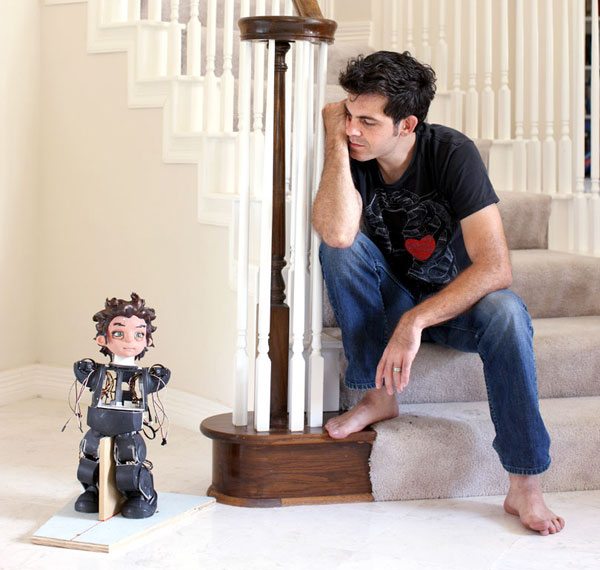I’m in Plano, puttering through a neighborhood full of similar-looking houses with manicured lawns and BMWs in the driveways. The place I’m looking for—the one that belongs to my cousin Amanda Hanson and her husband, David—could belong to anyone else, save for the wizard doll propped up on the porch. Oh, and the lab full of lifelike robots inside.
David, whose family calls him Deedah, founded Hanson Robotics. He mans a fleet of stunningly real-looking androids that are tweaked for government research and universities around the world, as well as for artificial intelligence research, cognitive psychology research, neuroscience research, social therapy, tutoring purposes, at least one David Byrne video, and buyers like Martine Rothblatt, a transgendered Vermont billionaire who ordered a blinking, speaking “portrait” of her wife, Bina, memories and earrings and all, in 2009. As crazy as it sounds, David says robots with Bina’s range of emotions could hit the market in the next five years, retailing for about $400.
They’ll be partly factory made, he explains, to cut down on the hand-built process he uses now.
After graduating from Highland Park High School, attending UNT, and getting a PhD from UTD, David moved on to the prestigious Rhode Island School of Design, then took an Imagineering job at Disney. By 2003, he had built Kbot, a buggy female android who broke down after a few months. (Though Hanson claims it never broke down because it was never actually working.) Her arrival was heralded by media outlets like the BBC and Popular Science, though, and some memorable fan mail.
Amanda calls it “the ho-bot” (it was modeled after David’s ex). Several years later, she was still politely answering Kbot’s male fans who’d hoped in earnest to have sex with a fake woman. “I’d say, ‘No, we’re not offering that,’ ” she remembers with a drawl, “ ‘but keep your eye on science, and thanks for writing.’ ”
Amanda’s own likeness lives at the University of Geneva—grinning, wrinkling her nose convincingly, and probably asking her imaginary husband for imaginary designer shoes outside the couple’s price range. But the android version of Zeno, the Hansons’ adorably quizzical 6-year-old son, is right here in Plano, on a dining room table.
Whirring and blinking and pronouncing my name “mmJORja” when we meet, robot Zeno is smaller and more cartoonish than the others. On a whim, I tell him I love him, and he flirts back, saying I’ve pushed his “robot buttons.”
I ask if he’s alive.
“No,” he says quickly. “I definitely feel sad when I understand how little I feel,” Zeno says, his pupils tracking mine. “Let’s face it. Just being alive is kind of a lonely thing, but being alive and a robot makes this especially lonely, because—”
He stalls as his creator fidgets with his speech software. As usual, David’s in reading glasses and the shirt he has worn the last five times we’ve hung out, a souvenir from the Hansons’ big husband-wife trip to Disney World. It has a lightning bolt Mickey Mouse head on the front.
David doesn’t think robots are sentient yet. But he believes we’re bound for a magnificent singularity, the kind Philip K. Dick wrote about. We’ll share experiences with them, analogous to those we share with animals. Robot feelings will be complex, soulful, rich—just different from ours.
The business “has been a bumpy road,” he says, one marked by rare windfalls and frequent worries about whether his team can mass-produce anything affordable. They’re getting close.
“We’re no Facebook yet,” he says. “But if we achieve what we’re trying to, then it’s going to be great.”







